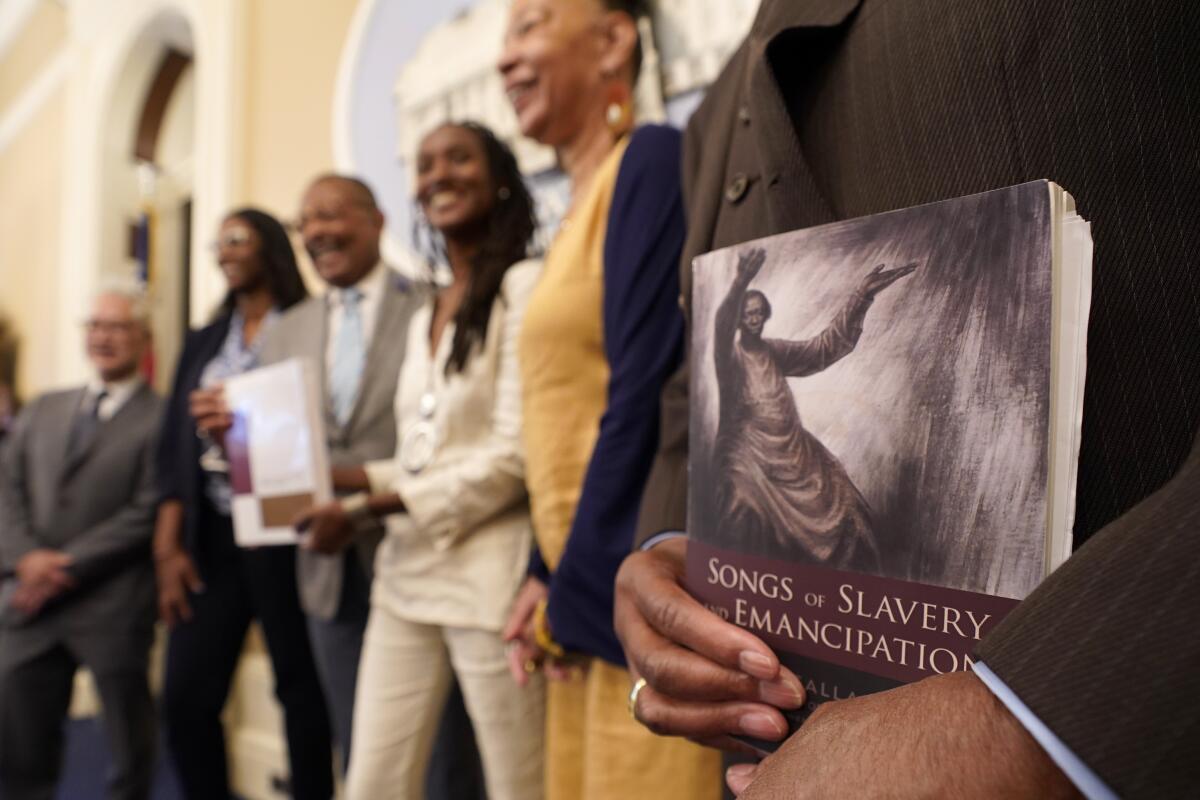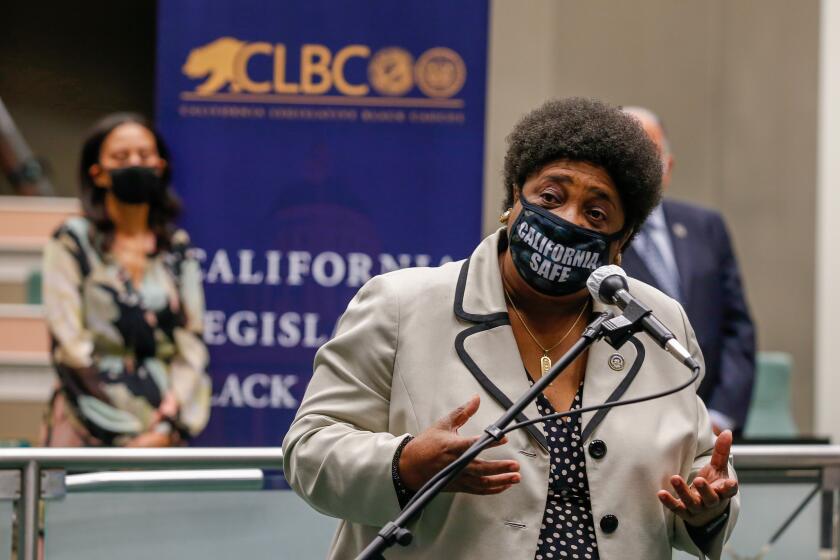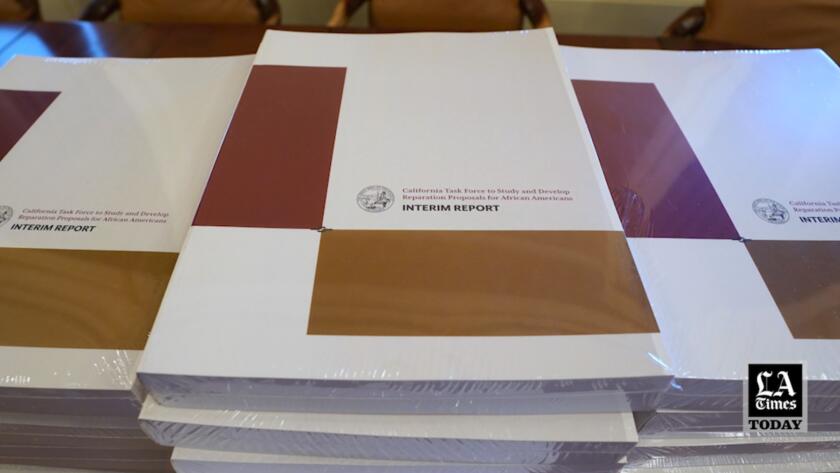Is California giving reparations for slavery? Here’s what you need to know

California’s Reparations Task Force voted on Saturday to recommend that the state issue a formal apology for slavery and potentially provide billions of dollars in cash payments, moving forward a historic effort to enact remedies and compensation for descendants of African Americans who were enslaved in the U.S.
The vote at a public meeting in Oakland marks the beginning of the end of the nine-member panel’s two-year process to craft a report recommending reparations for slavery, which is due to the state Legislature by July 1.
The report will act as a manual for lawmakers and Gov. Gavin Newsom, who established the task force in 2020 to study and gather evidence of the harms of slavery and lasting discrimination, as state elected officials begin to debate righting the wrongs of the past.
The task force has heard testimony from more than 133 witnesses, such as scholars detailing California’s racist history and economists who offered suggestions for how to quantify compensation for health disparities, mass incarceration and housing discrimination against descendants. Families affected by slavery shared their own experiences and called for various forms of remedies in 28 hours of emotional public comment at dozens of monthly meetings since the task force first gathered in June 2021.
As the group concludes its work, convincing lawmakers to pass the recommendations into law and provide hundreds of billions of dollars in reparations at a time when California is facing a budget deficit could be the biggest challenge yet.
“I’m optimistic that they’ll take a look at our proposals and engage in a good faith effort to implement them,” said Kamilah Moore, the chair of the task force.
Though California banned slavery in its 1849 Constitution, the state had no laws that made it a crime to keep someone enslaved or require that they be freed, which allowed slavery to continue. A disproportionate representation of white Southerners with pro-slavery views held office in the Legislature, state court system and in its congressional delegation.
California’s Fugitive Slave Law of 1852, which authorized slaveholders to use violent means to capture enslaved people who arrived in California before its statehood and escaped, or refused to return to slave states with their enslaver, was rare among free states.

Racial hierarchy continued to take root in California when slavery was abolished federally by the 13th Amendment in 1865. The task force’s findings detail the lasting consequences of segregation and discrimination against Black people in the state’s political, legal, health, financial, educational, cultural, environmental, social and economic systems, leading to both physical and mental health disparities and a racial wealth gap.
Who is eligible for reparations?
The question of eligibility has been among the most controversial issues for the task force. Some advocates made the case that all Black Californians should be eligible for reparations, though legal scholars provided testimony that broad race-based solutions could face legal challenges.
The task force ultimately restricted eligibility based on lineage as “determined by an individual being an African American descendant of a chattel enslaved person or the descendant of a free black person living in the United States prior to the end of the 19th century.”
In its compensation models, the task force cited population estimates from 2020 of less than 2 million non-Hispanic African American residents who lived in the state.
A government-appointed panel has taken action to define who should be able to receive reparations.
How do I prove eligibility?
That hasn’t been entirely answered yet.
The task force recommends that the Legislature create a new California American Freedman Affairs Agency dedicated to implementing the task force’s recommendations that are adopted into law, including determining eligibility and helping people prove their lineage. The agency should have a “genealogy branch to support potential reparations claimants by providing access to expert genealogical research to confirm reparations eligibility,” according to a draft of the final policy recommendations.
California’s Reparations Task Force is preparing to answer the pivotal question of who should receive reparations for slavery.
How much money will people receive?
Economists calculated preliminary estimates of monetary losses in three categories of community harms: health disparities, African American mass incarceration and over-policing, and housing discrimination.
The amounts each individual receives would be determined by the number of years they have resided in California for a minimum of six months. The money would be given to every eligible recipient and no one would need to provide proof that they suffered individual harms in each category.
- Compensation for health disparities: $13,619 for each year of residency. This figure was derived by comparing life expectancy between Black non-Hispanic and white non-Hispanic Californians.
- Compensation for mass incarceration and over-policing of African Americans: $2,352 for each year of residency in California during the war on drugs from 1971 to 2020.
- Compensation for housing discrimination: $3,366 for each year between 1933 and 1977 spent as a resident of the state of California.
The proposal calls for additional compensation for unjust property takings and the devaluation of African American businesses, which have not yet been quantified. The task force also suggests the Legislature adopt an individual claims process to provide reparations for those who can prove particular harms.
The report recommends that the Legislature provide initial down payments to begin the process, with more payments to follow, and prioritize the elderly as the first in line for compensation. The task force also noted that the amounts are conservative estimates and not final.
What else is the task force recommending?
A draft of the final report recommends “a range of policies needed to guarantee restitution, compensation, rehabilitation, satisfaction, and non-repetition,” included, but not limited to:
- Repeal or amend Proposition 209, a measure approved by California voters that banned affirmative action in 1996.
- Analyze laws, policies and ordinances from the local to the state level for racial impact prior to passage and after implementation.
- Amend the California Constitution to prohibit involuntary servitude.
- Pay fair market value for jail and prison labor.
- Abolish the death penalty.
- Fund community wellness centers in African American communities.
- Strengthen the Bane Act by eliminating the requirement that a victim of police violence show that the officer “specifically intended” to commit misconduct.
- Declare election day a paid state holiday.
- Restore voting rights to all formerly and currently incarcerated people.
- Implement rent caps for historically redlined ZIP Codes.
- Increase grants and financial assistance to improve homeownership rates among African Americans, including subsidized down payments and mortgage payments to those who reside in formerly redlined neighborhoods
- Allow descendants who reside in formerly redlined neighborhoods to transfer the assessed value of their primary home to a newly purchased or constructed primary residence.
- Provide free college tuition for all California residents eligible for monetary reparations.
- Build more parks in African American communities.
- Identify and remove Confederate monuments, markers and memorials.
- Create a guaranteed income program for descendants of an enslaved person.
- Automatically increase minimum wage on a regular basis to adjust for increases to the cost of living, including inflation.
- Provide interest-free loans to owners of small businesses in African American commercial areas.
- End the cash bail system.
- Repeal the “three strikes” law.
- Adopt universal single-payer healthcare coverage and a healthcare cost control system.
- Increase Medi-Cal reimbursement rates to match reimbursement rates of private insurance.
What’s next?
The task force meets one last time in Sacramento on June 29 before sending its recommendations to the Legislature. Two lawmakers who sit on the task force, state Sen. Steven Bradford (D-Gardena) and Assemblyman Reginald Jones-Sawyer (D-Los Angeles), are expected to lead efforts to convince their fellow lawmakers to provide reparations.
The Legislature widely approved the creation of the task force at a time when state revenues neared historic highs. Now that the state is in the midst of an economic crisis, it’s unclear whether Democrats will support reparation payments that could ultimately cost more than twice the annual state budget, or when the task force’s recommendations could come up for a vote.
Moore said the recommendation to provide initial down payments to eligible descendants and follow-up payments later could help offset those immediate budgetary concerns.
She pointed out that Newsom recently acknowledged California’s role in slavery during a national interview.
“He’s been kind of quietly letting us do our work, which I respect but ... I took that as a sign that he is essentially supportive of the work that we’ve been doing,” she said.
Any reparations or policies approved by lawmakers would require Newsom’s signature to become law.
Watch L.A. Times Today at 7 p.m. on Spectrum News 1 on Channel 1 or live stream on the Spectrum News App. Palos Verdes Peninsula and Orange County viewers can watch on Cox Systems on channel 99.
More to Read
Start your day right
Sign up for Essential California for news, features and recommendations from the L.A. Times and beyond in your inbox six days a week.
You may occasionally receive promotional content from the Los Angeles Times.










